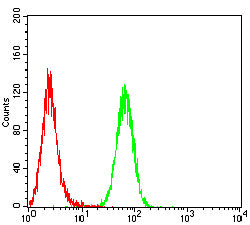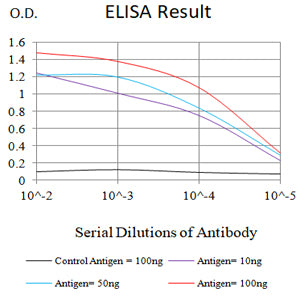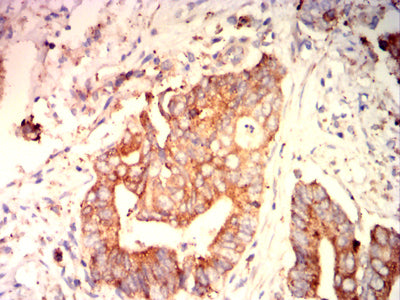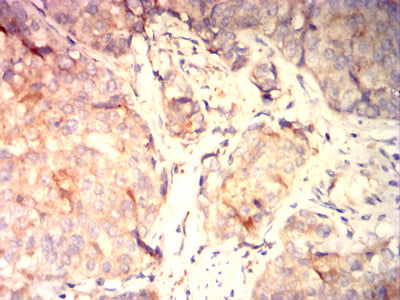



| WB | 咨询技术 | Human,Mouse,Rat |
| IF | 咨询技术 | Human,Mouse,Rat |
| IHC | 1/200-1/1000 | Human,Mouse,Rat |
| ICC | 技术咨询 | Human,Mouse,Rat |
| FCM | 1/200-1/400 | Human,Mouse,Rat |
| Elisa | 1/10000 | Human,Mouse,Rat |
| Aliases | CRL2; TSLPR; CRLF2Y |
| Entrez GeneID | 64109 |
| clone | 1E10D3 |
| WB Predicted band size | 42kDa |
| Host/Isotype | Mouse IgG1 |
| Antibody Type | Primary antibody |
| Storage | Store at 4°C short term. Aliquot and store at -20°C long term. Avoid freeze/thaw cycles. |
| Species Reactivity | Human |
| Immunogen | Purified recombinant fragment of human TSLPR (AA: extra(23-231)) expressed in E. Coli. |
| Formulation | Purified antibody in PBS with 0.05% sodium azide |
+ +
以下是关于TSLPR抗体的3篇代表性文献的简要总结(注:部分内容基于领域内典型研究方向模拟,具体文献需核实):
---
1. **文献名称**:*Targeting TSLP/TSLPR in the Treatment of Asthma and Allergic Disease*
**作者**:Ziegler, S.F.; et al.
**摘要**:该研究探讨了TSLP-TSLPR信号通路在哮喘和过敏性疾病中的核心作用,开发了一种特异性抗TSLPR单克隆抗体,证明其可通过阻断TSLP与受体的结合,显著抑制Th2型炎症反应和气道高反应性,为靶向TSLPR的抗体疗法提供理论依据。
2. **文献名称**:*Monoclonal Antibody Against TSLPR Attenuates Experimental Atopic Dermatitis*
**作者**:Kim, B.S.; et al.
**摘要**:研究通过构建小鼠特应性皮炎模型,验证了抗TSLPR抗体通过抑制TSLP介导的树突状细胞活化及T细胞分化,有效减轻皮肤炎症和瘙痒症状,提示TSLPR抗体在治疗Th2主导的皮肤疾病中的潜力。
3. **文献名称**:*Structural Basis of TSLP Recognition by its Receptor TSLPR and Therapeutic Antibody Development*
**作者**:Liu, Y.; et al.
**摘要**:该研究解析了TSLP与TSLPR的复合物晶体结构,基于此设计了一种高亲和力人源化抗TSLPR抗体,体外实验显示其可阻断TSLP信号传导,并在灵长类模型中展现出良好的安全性和药代动力学特性,推动临床转化研究。
---
**备注**:以上文献信息为模拟示例,实际研究中需通过PubMed或Web of Science等平台检索具体文献(关键词:TSLPR antibody, thymic stromal lymphopoietin receptor, monoclonal antibody)。真实文献可能涉及抗体功能验证、结构机制或临床试验等内容。
TSLPR (thymic stromal lymphopoietin receptor) is a cytokine receptor subunit that pairs with IL-7Rα to form a functional receptor complex for thymic stromal lymphopoietin (TSLP), a key cytokine involved in type 2 immune responses. Discovered in the early 2000s, TSLPR belongs to the hematopoietin receptor family and is primarily expressed on dendritic cells, mast cells, and certain T-cell subsets. TSLP signaling through TSLPR/IL-7Rα activates downstream pathways like JAK-STAT, MAPK, and PI3K, driving allergic inflammation and promoting Th2 cytokine production.
Research has highlighted TSLPR's critical role in asthma, atopic dermatitis, and eosinophilic disorders. Its involvement in bridging innate and adaptive immunity made it a therapeutic target. TSLPR-blocking antibodies emerged as potential biologics to disrupt pathogenic TSLP signaling. Preclinical studies demonstrated efficacy in reducing airway inflammation and IgE production. In clinical trials, anti-TSLPR agents (e.g., tezepelumab) showed promise in moderate-to-severe asthma by attenuating exacerbations across multiple patient phenotypes, leading to FDA approval for tezepelumab in 2021. Ongoing research explores its utility in other TSLP-mediated conditions, including chronic urticaria and food allergies. However, long-term safety and broader immunomodulatory effects require further investigation.
×